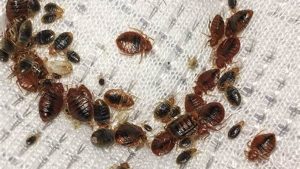Ever wondered what smells could send those pesky bed bugs running for the hills? Well, you’re in luck! We askingpest.com got the inside scoop on the odors that these blood-sucking critters absolutely can’t stand. From essential oils to household staples, there’s a whole arsenal of scents that might just help you reclaim your bedroom from these unwanted guests.
The Nose Knows: Understanding Bed Bug Behavior

Before we dive into the smelly solutions, let’s talk about why scents matter to bed bugs in the first place. These tiny terrors are surprisingly sophisticated when it comes to sniffing out their next meal – that’s you, by the way!Bed bugs have keen sensory receptors that help them detect heat, carbon dioxide, and yes, even your unique human scent. It’s like they have a built-in GPS system leading them straight to your sleeping form. Talk about creepy, right?But here’s the good news: just as certain smells attract them, others can repel them. And that’s where our odorous allies come into play.
The Smell-Good, Feel-Bad (for Bed Bugs) Squad
Let’s kick things off with a fan favorite: lavender. Not only does it help you relax, but it also sends bed bugs into a tizzy. Who knew these little vampires had such refined tastes?Next up, we’ve got tea tree oil. This potent essential oil is like kryptonite for bed bugs. It not only repels them but can also mess with their exoskeletons. Double whammy!And let’s not forget about peppermint. While it might remind you of candy canes and fresh breath, for bed bugs, it’s more like a minty fresh nightmare.
Citrus Zest: Not Just for Cooking Anymore
Here’s a zesty twist – bed bugs can’t stand the smell of citrus. So, that bottle of lemon juice in your fridge? It’s not just for making lemonade anymore!Blood orange oil is another citrusy superhero in the fight against bed bugs. Its strong scent is like a “No Vacancy” sign for these unwanted houseguests.
Spice It Up: The Pungent Protectors
Cinnamon isn’t just for spicing up your latte – it’s also a powerful bed bug deterrent. Who knew your spice rack could double as pest control?And let’s hear it for powdered pepper! While it might make you sneeze, it makes bed bugs turn tail and run.
The Unexpected Heroes: Household Items That Pack a Punch
Now, here’s where things get interesting. Rubbing alcohol isn’t just for cleaning wounds – it’s also a bed bug’s worst enemy. Not only does the smell repel them, but it can also dry them out if applied directly. Talk about adding insult to injury!And believe it or not, diatomaceous earth – that powdery stuff you might use in your garden – is like a death sentence for bed bugs. Its smell might not bother them, but its desiccating properties certainly do.
A Word of Caution: When DIY Isn’t Enough
While these scents can be helpful in deterring bed bugs, it’s important to remember that they’re not a cure-all. If you’re dealing with a full-blown infestation, you might need to call in the big guns – and by that, we mean professional pest control.These little buggers are notoriously hard to get rid of, and sometimes, DIY methods just don’t cut it. So, if you’ve tried the smelly approach and you’re still waking up with bites, it might be time to bring in the experts.
The Nose Knows Best: Final Thoughts on Scent-Based Bed Bug Control
At the end of the day, using scents to repel bed bugs can be a helpful tool in your pest control arsenal. It’s a natural, affordable way to make your home less appealing to these unwanted visitors.But remember, it’s just one piece of the puzzle. Combining scent-based repellents with other methods like regular cleaning, decluttering, and vigilant monitoring can give you the best chance of keeping your home bed bug-free.So go ahead, unleash the power of smell in your battle against bed bugs. Your nose – and your bite-free skin – will thank you!
Real-Life Experience: The Smells That Bed Bugs Hate the Most
Bed bugs are a nightmare for anyone who encounters them. These tiny, bloodsucking insects can turn your peaceful sleep into a restless ordeal. But did you know that certain smells can actually repel bed bugs? Let’s dive into some real-life experiences and scientific insights on the scents that bed bugs hate the most.
The Battle Begins: Discovering the Power of Essential Oils
When I first discovered bed bugs in my home, I was horrified. The bites were itchy and uncomfortable, and I knew I had to act fast. Traditional chemical treatments were an option, but I was concerned about the potential health risks and environmental impact. That’s when I stumbled upon the idea of using essential oils.
Lavender Oil: A Calming Yet Potent Repellent
Lavender oil was my first line of defense. Known for its calming properties, I was surprised to learn that bed bugs absolutely despise its strong aroma. I mixed a few drops of lavender oil with water in a spray bottle and generously sprayed my bedding, mattress, and furniture. The fresh scent was a bonus, and I noticed a significant decrease in bed bug activity almost immediately.
Tea Tree Oil: A Multi-Purpose Miracle
Next, I tried tea tree oil. This essential oil is renowned for its antiseptic properties and ability to disrupt the exoskeletons of insects. I added tea tree oil to my cleaning routine, wiping down surfaces and spraying it in the crevices where bed bugs might hide. The results were impressive – fewer bites and less evidence of bed bugs.
Unexpected Allies: Household Items That Work Wonders
I was amazed to find that common household items could also help in the fight against bed bugs. Rubbing alcohol, for instance, was a game-changer. Its strong smell repelled the bugs, and its drying effect killed them on contact. I sprayed rubbing alcohol on my mattress and around the bed frame, taking care to avoid any fire hazards.
Diatomaceous Earth: A Natural Solution
Diatomaceous earth, a natural powder, was another unexpected hero. While it doesn’t have a strong smell, its desiccating properties were lethal to bed bugs. I sprinkled it around the perimeter of my room and in areas where I suspected bed bugs were hiding. The results were slow but steady – fewer bugs and a more peaceful night’s sleep.
Combining Scents for Maximum Effectiveness
Through trial and error, I discovered that combining different scents could enhance their effectiveness. A mixture of lavender and tea tree oil, for example, created a potent repellent that bed bugs couldn’t stand. I also experimented with cinnamon and peppermint oil, both of which added an extra layer of protection.
The Reality Check: When DIY Isn’t Enough
Despite my best efforts, there came a point when I realized that the infestation was too severe for DIY methods alone. Bed bugs are notoriously resilient, and sometimes professional intervention is necessary. I called in a pest control expert who used a combination of heat treatment and chemical solutions to eradicate the remaining bugs.
Conclusion: The Power of Smell in Bed Bug Control
Using scents to repel bed bugs can be a natural and effective way to manage minor infestations. Essential oils like lavender, tea tree, and citrus oils, along with household items like rubbing alcohol and diatomaceous earth, can make a significant difference. However, for severe infestations, professional help is often required. By understanding the behavior and sensory mechanisms of bed bugs, we can better utilize these natural repellents and keep our homes bed bug-free. So, if you find yourself battling these pesky invaders, don’t underestimate the power of smell – it just might be the key to a peaceful night’s sleep.
Key facts and figures about bed bugs
| Category | Fact/Figure |
|---|---|
| Lifespan | 4-6 months on average, up to 1 year in ideal conditions |
| Size | Adults: 4-5 mm long |
| Eggs | 1 mm in length (size of a pinhead) |
| Egg-laying capacity | 1-5 eggs per day, 200-500 in a lifetime |
| Development time | About 6 weeks from egg to adult under optimal conditions |
| Feeding habits | Can ingest 7 times their body weight in blood |
| Feeding frequency | Weekly feedings for adults |
| Temperature tolerance | Can survive 46°F to 113°F |
| Dormancy period | Can survive up to 1 year without feeding |
| Prevalence | Found in all 50 U.S. states |
| Infestation rate | Nearly 20% of Americans have experienced or know someone who has experienced bed bugs |
| Identification accuracy | Correctly identified only 16% of the time; often mistaken for fleas |
| Peak season | June to October in the U.S. |
| Most affected U.S. regions | Southeast (30% of infestations), Ohio (most infested state) |
| Top infested U.S. city | Philadelphia |
| Bite reaction time | Can range from 1 hour to 2 weeks after being bitten |
Bed Bug FAQ
Q: What are bed bugs?
A: Bed bugs are small, oval-shaped insects that are brownish in color. They feed on the blood of humans and animals, typically at night.
Q: What do bed bugs look like?
A: Adult bed bugs are about 4-7mm long, oval-shaped, and brown in color. They turn reddish after feeding. They are visible to the naked eye but can be more easily spotted using a flashlight.
Q: Where do bed bugs hide?
A: Bed bugs prefer to hide in dark, cool places close to their food source. Common hiding spots include:
- Seams and tufts of mattresses
- Box springs
- Bed frames and headboards
- Furniture crevices
- Behind baseboards and wallpaper
- In electrical outlets
- Under carpets and rugs
Q: How do bed bugs spread?
A: Bed bugs can spread through:
- Luggage and clothing during travel
- Used furniture
- Crawling from one room or apartment to another
Q: What are the signs of a bed bug infestation?
A: Signs of bed bug infestation include:
- Small, itchy red bumps on the skin
- Dark spots on bedding (bed bug excrement)
- Bloodstains on sheets
- A sweet, musty odor
- Visual sightings of the bugs themselves
Q: Can bed bugs fly or jump?
A: No, bed bugs cannot fly or jump. They can only crawl, but they are fairly fast.
Q: Do bed bugs transmit diseases?
A: Bed bugs are not known to transmit any infectious diseases to humans. However, their bites can cause skin irritation and allergic reactions in some people.
Q: How can I prevent bed bug infestations?
A: To prevent bed bug infestations:
- Inspect second-hand furniture before bringing it home
- Check hotel rooms when traveling
- Regularly inspect and clean your home
- Use mattress encasements
- Be cautious when using shared laundry facilities
Q: How are bed bug infestations treated?
A: Effective bed bug control typically requires professional intervention. Treatment methods may include:
- Heat treatment (most effective)
- Chemical treatments
- Vacuuming and steam cleaning
- Disposing of heavily infested items
Q: Can I treat a bed bug infestation myself?
A: While there are DIY methods, it’s generally not recommended to treat bed bug infestations yourself. Over-the-counter products can be ineffective and may even spread the infestation. It’s best to contact a professional pest control service for effective treatment.
Q: How long can bed bugs live without feeding?
A: Bed bugs are hardy and can survive for several months to a year without feeding, depending on the temperature and humidity conditions.This FAQ covers the most common questions about bed bugs, their identification, prevention, and treatment. It provides concise, factual information to help people understand and deal with potential bed bug issues.


